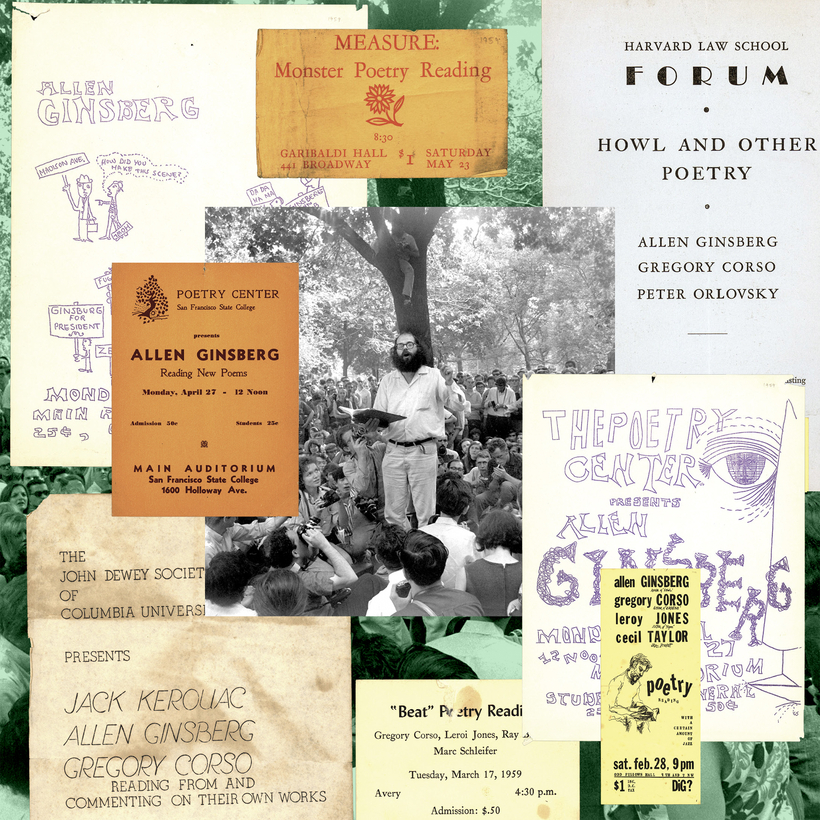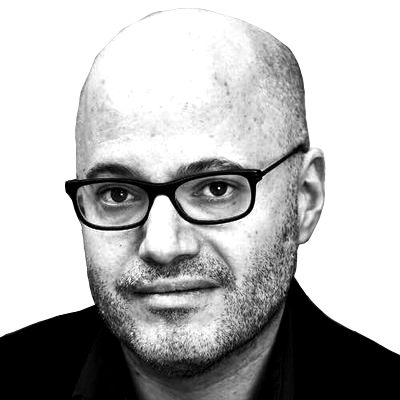When I was 19, I was at a MoMA exhibition on the photography of the Beat Generation, looking at a portrait of William Burroughs by Allen Ginsberg. I turned to my right, and there he was—an impossible figure to miss—with a coat and tie, bearded and bald, professorial, sage-like, someone who appeared to know everything, but who still had lifetimes to learn, an older man, a child. Ginsberg was in his 60s, but he seemed like he hadn’t been born yet. He appeared in a Gap ad looking exactly like that. (He donated the proceeds to the Jack Kerouac School of Disembodied Poetics.)
We chatted, and he was extremely affable, so much so that he invited me to his apartment on East 10th Street, where, he said, there would be a gathering of poets. But I had plans with my girlfriend, and that stopped the conversation. (Regrets, I’ve had a few.)
Yet Allen Ginsberg walking among us was astonishing enough. His poems were sacred to me, and the dirty words that got him into all that trouble and the fame that followed were in the service of beauty and truth.
In “A Supermarket in California,” Ginsberg imagined encountering Walt Whitman among the produce:
I saw you, Walt Whitman, childless, lonely old grubber, poking among the meats in the refrigerator and eyeing the grocery boys.
I heard you asking questions of each: Who killed the pork chops? What price bananas? Are you my Angel?
Ginsberg was our angel. Look beneath your shopping cart—poetry is everywhere if you are so attuned. Ginsberg, like Whitman, is still underneath our boot soles. He left his corporeal existence in 1997, at age 70, but he left behind filing cabinets the size of Texas, and, in his new book, Material Wealth, Pat Thomas unloads the Ginsberg archive and leaves no stone unturned.
He, who so famously told us that he “saw the best minds of his generation starving hysterical naked,” kept a record of all of them. He left behind phone numbers—do you want to give Diane di Prima or David McCullough a ring?—and programs, and, like many writers, held on to his rejections and his indignant letters to the editors.
Allen Ginsberg left his corporeal existence in 1997, but he left behind filing cabinets the size of Texas.
We get to see his résumé shortly before Howl made it unnecessary. In it, he tells us that he is 26 and single, as if it’s a dating profile. He held on to a poster from Patti Smith’s very first poetry reading. He saved Terry Southern’s parody of Howl called Towel, a typewritten pitch-perfect rhapsody of rancidity that would make even the most libertine among us wince.

He worked as William Burroughs’s agent, and tried to get his friend Herbert Huncke—the Beat of the Beats—into Playboy. The response, from 1959, included this judgment: “I fear that the subject matter, a giant junkie who is also a hermaphrodite, would make it unacceptable for the pages of PLAYBOY.” A long letter to The New York Times Book Review concluded, “Must the Journalists’ sneer continue to be directed at artists?” He corrected them that they are not “beatniks.” They are Beat.
He also kept track of his troublemaking, first when he was kicked out of Cuba (for opposing their policies on homosexuality), then from Prague, where he was kicked out after being crowned “King of May.” He saved photos of himself with poets and dissidents. They are not identified, but it would make sense that future Czech Republic president Václav Havel, a friend, was among them.
Among the keepsakes are letters to the American Nazi Party (“I heard you want to kill me, can we meet and discuss it?!?”) and a record of his phone call with Henry Kissinger from 1971 in which he failed to stop the Vietnam War.
He, who so famously told us that he “saw the best minds of his generation starving hysterical naked,” kept a record of all of them.
Many people keep a catalogue of their successes, but, for the author of Ode to Failure, this catalogue saved everything. “I never dissolved Plutonium or dismantled the nuclear Bomb before my skull lost hair,” he wrote. That unmistakable voice of his—where everything he had read was just as important as everything he could never attain—was part of why so many readers related.
He survived a lot—the schizophrenic mother who was the subject of Kaddish, being gay in a gay-unfriendly world, being an individualist among the herd, being who he was in spite of everything else. And yet Material Wealth is a catalogue of too many friends and lovers to count. It didn’t always stop the melancholy, but so much of his art was defined by all kinds of courtship. Fame kept him busy, but it never stopped the desperation of the man who wrote, “America, I’ve given you my all, and now I’m nothing.” There was a lot of something there, too.
The pièce de résistance, a postscript at the end, is a long, typewritten response to Bob Dylan’s Blood on the Tracks from 1975, when it was hot off the presses; Thomas’s book is the first time it has been published. We see Ginsberg’s front-row ticket for Dylan and the Band from the previous year, but this is new, and it excites our bard.
He is following Dylan right down to the level of breath—he once commented how Dylan was at one with his own breath—and he comments on each verse of “Idiot Wind.” It’s a song about not being able to let go, and he can’t let go of it, either. The final verse of the song, the “curse,” he tells us, is “a genius stroke of ecological vastness and tiny domestic paternal common sense.”
Ginsberg, coming to praise Dylan, writes another poem, as vast as the song’s rage and the poet’s frustrations. He tried to chant his way out of it, but he was still who he was with all his limitations. He knew it, and it was what made him lovable.
The book opens with a quotation from Dylan, the material wealth of Material Wealth: “Seeing Ginsberg was like going to the Oracle of Delphi. He didn’t care about material wealth or political power. He was his own kind of king. He achieved what any poet could hope to achieve.”

David Yaffe is a professor of humanities at Syracuse University. He writes about music and is the author, most recently, of Reckless Daughter: A Portrait of Joni Mitchell. You can read his Substack here


